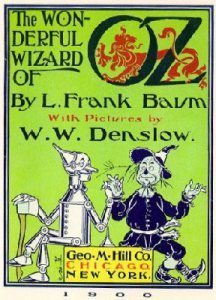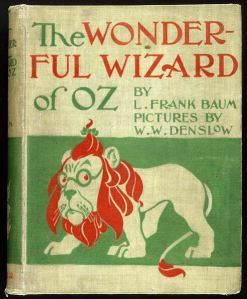Thoughts on The Wizard of Oz
Most of my students enjoyed The Wonderful Wizard of Oz, with many, though familiar with the movie, reading the book for the first time. We leave behind Charlotte's Web, with its prose that E.B. White labored over for years, simple and as perfect as can be, for a work begun as a story Frank Baum first told to his four sons. It shows signs of its origins in its episodic nature – That's it for tonight, boys! — and the style is closer to that of fairy tales, also from an oral tradition, in which tellers dived into a story before the audience might scatter. In The Wonderful Wizard of Oz, I kind of love that Uncle Henry's first words are, "There's a cyclone coming, Em."
It's not a style I expect or particularly want to achieve in my own writing, but reading these works, I'm reminded to sometimes stop obsessing about how to get my characters to leave a room. It probably won't involve cyclones or setting forth with a basket of bread or an ax, but a short, direct sentence can do the trick.
We talked about characters, and their connection to archetypes, comparing the foursome of Dorothy, the Scarecrow, the Tin Woodman, and the Cowardly Lion, with Harry Potter, Hermione, Ron, and Hagrid in another popular book which also addresses magic, witches, friendship, intelligence, and bravery and was published about a hundred years later. I asked what people thought of Dorothy, and one girl told us how she wanted to be her as a girl. Not only did she have red shoes, but she demanded her family call her Dorothy. "But now I found her annoying."
Other concurred. What some might see as a Taoist or take-it-as-it-comes attitude, others found bland and silly, and wanted her to wake up. If she was going to kill a witch, they didn't want that to be by accident. When the wizard tricked her, where was the angry response?
But one student pointed out that her lack of complexity was what allowed the real heroes of the tale, the Scarecrow, the Tin man, and the Lion, to grow. If we were too involved with Dorothy, we might miss what makes those characters endearing. The lesser importance of this girl is reflected in the books early covers (and W.W. Denslow's depiction of Dorothy is no Judy Garland). Another student pointed out that this was the case with the beginning of Harry Potter, too. Harry's buddies seem more complicated as things start out, something that even he recognizes. I liked when Harry showed a talent for Quidditch, and felt proud that acclaim came from something that he did, rather than being famous for a lighting bolt-shaped scar on his forehead or history. This is an idea that's sticking with me, one of the great gifts of teaching, though I'm not sure what I'll do with it. Except that it turns around the way I often think about books, with one main character in the center, and it's always great to see things from a new direction.













